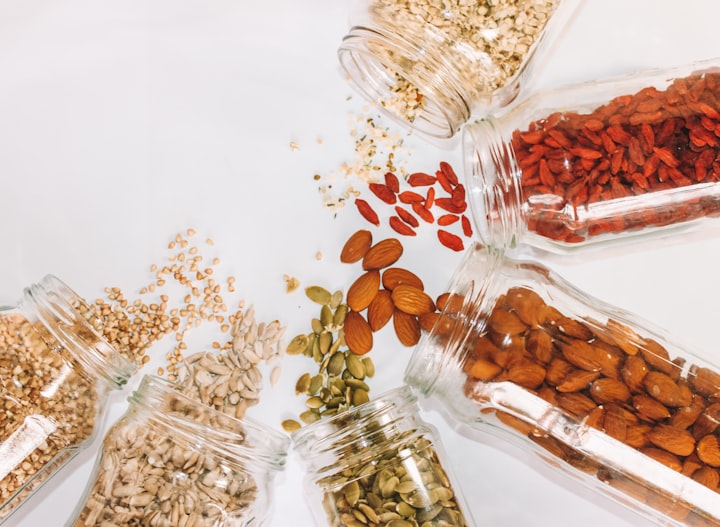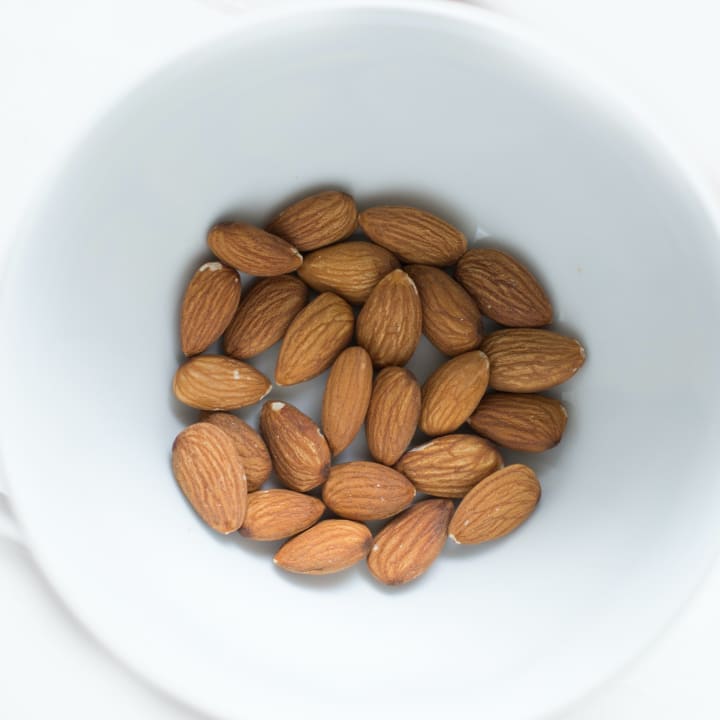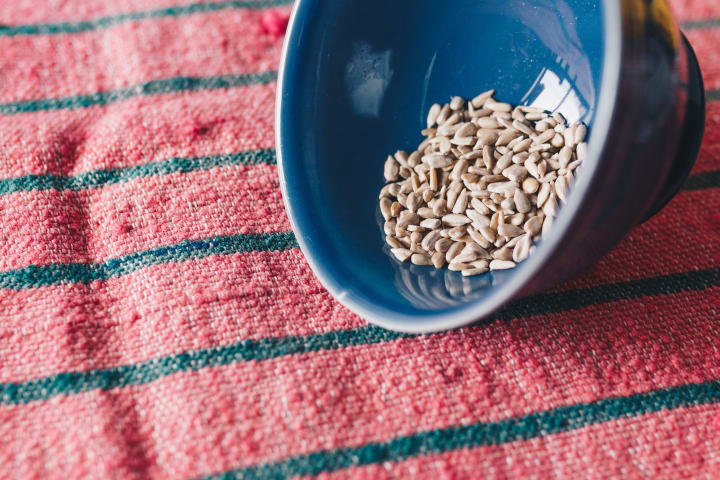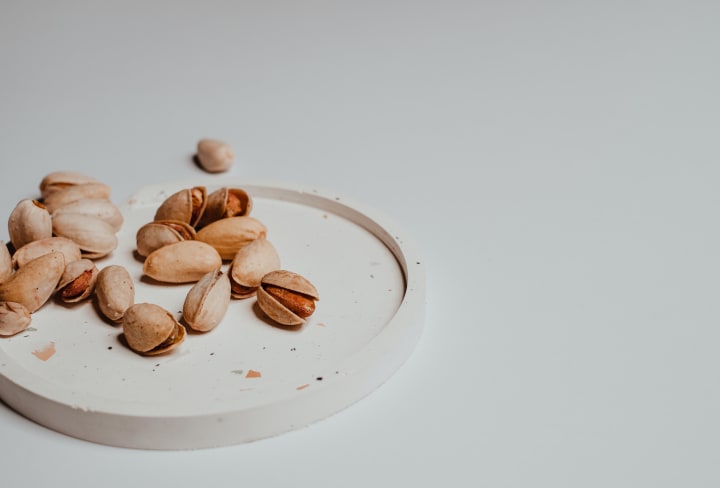
NUTS AND SEEDS::INTRODUCTION:
Nuts and seeds are high in nutrients such as healthy fats, protein, fiber, vitamins, and minerals. Almonds, cashews, walnuts, and peanuts are examples of nuts, while chia seeds, flaxseeds, pumpkin seeds, and sunflower seeds are examples of seeds.
Nuts and seeds are an excellent supplement to a healthy diet since they give numerous health advantages. They include heart-healthy fats that can help lower cholesterol and lower the risk of heart disease. They are also abundant in protein, which aids in muscle growth and repair. Furthermore, nuts and seeds are high in fiber, which can aid digestion and enhance feelings of fullness.
Nuts and seeds can be consumed raw, roasted, or cooked. They can be mixed into smoothies, salads, porridge, or eaten on its own as a snack. But, it's crucial to remember that nuts and seeds are heavy in calories, so practice portion control to avoid overeating.
ALMOND:
Almonds are a type of tree nut that is widely consumed around the world. It is high in healthy fats, protein, fiber, vitamins, and minerals, making it a superfood. Almonds are a flexible meal that can be eaten raw, roasted, salted, or tasted. They are frequently used in a variety of recipes, desserts, and snacks.

Almonds are indigenous to the Middle East and have been grown for thousands of years. Many countries currently grow them, including the United States, Spain, Australia, and Italy. California is the world's greatest producer of almonds.
Almond consumption has been linked to a variety of health benefits, including enhanced heart health, weight control, and a lower risk of chronic diseases such as diabetes and Alzheimer's disease. Yet, because almonds are high in calories, they should be consumed in moderation, just like any other food.
CASHEW:
Cashews are a sort of nut that originated in Brazil but is now farmed throughout the world, including India, Vietnam, and Africa. They are widely consumed as a snack or used in cooking, and are generally seen in meals like as stir-fries, curries, and salads.

Cashews are high in beneficial fats, protein, fiber, and a variety of vitamins and minerals. They include a lot of monounsaturated and polyunsaturated fats, which are good for your heart. Cashews also provide magnesium, which is good for bones, and copper, which is good for brain function and immunity.
Cashews are quite high in calories and fat when compared to other nuts, so they should be used in moderation as part of a balanced diet. While salted and roasted cashews may include more sodium and additional oils, raw, unsalted cashews are the healthiest alternative.
PEANUT:
Peanuts are a type of legume that is often eaten as a nut. They're high in protein, healthy fats, fiber, and a variety of vitamins and minerals. Peanuts are commonly consumed raw, roasted, or cooked, and are a component in cuisines such as peanut butter, satay sauce, and pad Thai.

Peanuts are an excellent source of protein, with approximately 7 grams per ounce. They are also high in monounsaturated and polyunsaturated fats, both of which are good for your heart. Peanuts also include vitamin E, magnesium, and phosphorus, all of which are beneficial to bone health and immunity.
While peanuts are generally considered a healthy snack, they are also very high in calories when compared to other nuts, therefore practicing portion control is crucial to avoid overeating. Furthermore, some people may be allergic to peanuts, which can cause severe reactions and even death.
SUNFLOWER SEED:
Sunflower seeds are the edible seeds of the North American native sunflower plant. They're a popular snack and ingredient in many different cuisines all around the world. Sunflower seeds are a nutritious supplement to a balanced diet since they are high in healthy fats, protein, fibre, vitamins, and minerals.

Sunflower seeds can be eaten raw, roasted, salted, or flavour and are normally sold shelled or unshelled. They are widely used in baked goods, salads, and trail mix. Sunflower oil, derived from sunflower seeds, is a popular cooking oil that is frequently used in salad dressings and frying.
Consuming sunflower seeds has been related to a variety of health benefits, including better heart health, less inflammation, and a lower risk of chronic diseases like diabetes and cancer. However, because sunflower seeds are heavy in calories and fat, they should be used in moderation.
Some people are allergic to sunflower seeds, and it is critical to consult a doctor if you feel any allergy symptoms after eating them.
WALNUT:
Walnuts are a type of tree nut that is highly nutritious and widely consumed around the world. They are high in healthful fats, protein, fiber, vitamins, and minerals and are sometimes referred to as a superfood.

Walnuts are indigenous to the Mediterranean and Central Asia, where they have been grown for thousands of years. They are now grown in a variety of nations, including the United States, China, Turkey, and Iran.
Walnuts are often consumed raw, roasted, salted, or flavour, and they are frequently used in baked products, sweets, and snacks. Walnut oil, derived from the nuts, is a popular cooking oil that is frequently used in salad dressings and cooking.
Eating walnuts has been associated with several health befits, including improved heart health, reduced inflammation, and lower risk of chronic diseases such as diabetes and cancer. They have also been shown to improve brain function and may help prevent age-related cognitive decline.
However, like any food, it is important to consume walnuts in moderation as they are high in calories. Some people may be allergic to walnuts, and it is important to speak to a healthcare provider if you experience any allergic symptoms after consuming them.
PUMPKIN SEED:
The edible seeds of the pumpkin fruit are known as pumpkin seeds. They are popular in many regions of the world and are high in healthful fats, protein, fiber, vitamins, and minerals.

Pumpkin seeds are often marketed raw or roasted and can be consumed as a snack or utilized as an ingredient in a variety of recipes such as salads, soups, and baked products. Pumpkin seed oil, derived from the seeds, is also widely used in salad dressings and cooking.
Consuming pumpkin seeds has been linked to a variety of health benefits, including better heart health, a lower risk of certain malignancies, and less inflammation. They are also high in zinc, which is necessary for immunological function and wound healing.
Yet, because pumpkin seeds are heavy in calories, they should be consumed in moderation, just like any other food. Some people are allergic to pumpkin seeds, so if you suffer any allergy symptoms after eating them, consult with your doctor. Furthermore, if the pumpkin seeds are salted, they may be high in sodium, so read the nutrition label before buying them.
PISTACHIO:
Pistachios are a type of tree nut that is popular as a snack or as a component in many cuisines. They are high in healthful fats, protein, fiber, vitamins, and minerals and are sometimes referred to as a superfood.

Pistachios are originally from the Middle East, but they are now grown in a variety of nations, including the United States, Iran, and Turkey. They are typically eaten roasted or salted and can be utilized in a variety of meals such as salads, desserts, and baked products.
Pistachio consumption has been linked to a number of health advantages, including enhanced heart health, decreased cholesterol levels, and reduced inflammation. They are also high in antioxidants, which can help protect against cellular damage and may lower the risk of some diseases.
In addition to their health benefits, pistachios are low in calories when compared to other nuts, making them an excellent choice for weight loss. Nonetheless, pistachios should be consumed in moderation because they are still high in calories and might contribute to weight gain if ingested in excess.
Overall, pistachios are a nutritious and healthful meal that may be eaten as a snack or utilized as a component in a variety of cuisines.
Because to their high quantity of good fats, fibre, vitamins, minerals, and antioxidants, nuts and seeds have a variety of health benefits, including increasing heart health, improving brain function, assisting with weight management, and lowering the risk of chronic diseases.
About the Creator
SujiDeepz
Creator of More, I hope you find yourself in between the spaces of my words:)






Comments
There are no comments for this story
Be the first to respond and start the conversation.